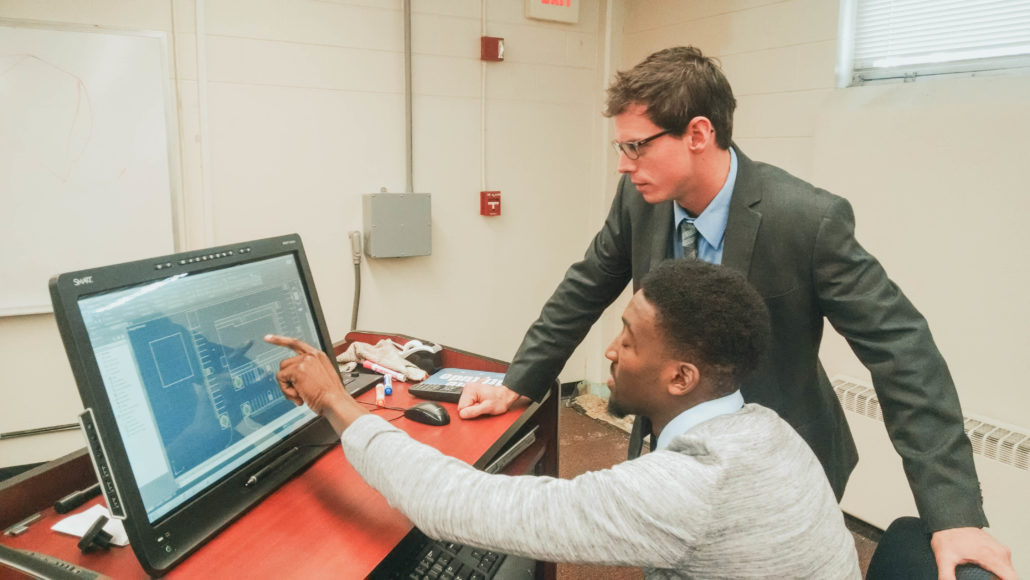
Share This Article!
Related Articles
Call Me MiSTER Helps Clemson’s Men of Color Become ‘Nation Builders’
By: Saavon Smalls
Ask Winston Holton, field coordinator of the Call Me MiSTER program, to describe the program, and he’ll tell you “revolutionary.”
“It’s really hard to encapsulate all that we endeavor to do and be,” said Holton. “It is so transformational, both for the Misters we work with, but also for the countless number of young people that [the Misters] will impact over their careers.”
Formed in 2000, Call Me MiSTER (Mentors instructing Students Toward Effective Role Models), was created to increase the number of men of color in the classroom, helping to increase the quality of education.
“We’re preparing [the Misters] to go into communities and revitalize those communities,” Holton said. “…we’re trying to help these young men become nation builders.”
The Misters often come from low – income communities and are Hispanic, Latino and African- American.
“It is so transformational, both for the Misters we work with, but also for the countless number of young people that [the Misters] will impact over their careers.”
“Many of them hail from places that struggle educationally, socially and economically, so to have these young men go back to similar places [to mentor] and be those beacons of hope … to demonstrate that you can go to Clemson University and be a person of substance; it is a vision of social change” explains Holton.
These resilient and purposeful young men are making excellent community and school leaders. Holton said that much of the mentoring he and his staff do for the Misters isn’t to reshape them. Rather, it’s to continue to guide them and expand upon their best qualities.
“We’re not cookie-cutter. We don’t have a preconceived notion about what the outcome is going to look like for our guys. …. We believe that we can help these young men get to a place of understanding who they are individually, and unleash that power. That’s all we need to do; we let them be them. The work we do primarily is to reconnect them with their better selves.”
Holton started his own journey in Call Me MiSTER during his years in graduate school. Prior to that, he was working in a youth center in inner-city Boston, but was displeased with the results.
“In my time [at the center] … I was totally dissatisfied in my ability to work with these young men,” Holton said of the teens he encountered in the program. Holton realized that he needed to find some way to help these kids, but sooner.
“It was then in Boston that I decided I wanted to be an elementary school teacher.”
Soon after, he left Boston and headed to Clemson, working as a graduate assistant in the Call Me MiSTER program. Upon graduation, Holton spent the next few years of his life as an elementary school teacher in Anderson County. But what would soon draw him back to the Call Me MiSTER program would be numbers — the numbers of impacted students.
However, that was met first with skepticism.
“Jeff Davis, my predecessor, when he challenged me to take his position, my first instinct was ‘No.’ He said ‘You are a good elementary school teacher, which means every year, you will impact 25 kids. Imagine being a part of a program that would produce 25, 50 teachers a year who could each impact 25 kids.’”
By that point, Holton was hooked.
“That’s math that I can’t argue,” he said with a laugh. “Fourteen years later, here I am.”
When it comes to impact, Holton believes that the program best impacts the Misters.
“I teach so that I learn, so fundamentally, I always feel that it impacts individually the Misters most. It’s about them constantly getting better.”
Of course that doesn’t mean that the community the program serves isn’t affected as well.
“By nature of who we are challenging these young men to be, certainly on any given day, they are impacting countless students, young people and adults. It’s more than just impacting the school system. It’s about impacting your church, home, grocery store — it’s about who you are in all of these interactions.”
“By nature of who we are challenging these young men to be, certainly on any given day, they are impacting countless students, young people and adults. It’s more than just impacting the school system. It’s about impacting your church, home, grocery store — it’s about who you are in all of these interactions.”
Through Holton’s 15 years with the program, he says that he has seen a vast change in the lives of the Misters. While many deal with abandonment in their family, homelessness, and more, the growth that they develop in their four years in the program is heartwarming.
“Our program is 90 to 93 percent South Carolinian. They are what some of these places in South Carolina breed. I see a transformation and I see how they utilize what they’ve learned to transform others.”
Since the program’s inception in 2000, Call Me MiSTER has gone to 16 other SC schools and eight colleges nationally. Holton attributes this success to the change that the Clemson Misters have made in their lives as well as the communities they serve.
“Today’s student is a little bit different from yesterday’s student. So when others see the success of Clemson’s Misters, they want to bring that success to their area.”
When it comes to this program, Holton believes that he succeeds “every day,” whether it be with the current Misters or through the transformational impact of program alumni. It is the work that he has put in with these young men that gives him pride.
“It doesn’t have to be a direct success of mine for me to recognize it as a success, because it’s more about them achieving their goals.”
Ultimately, Holton has nothing but thanks for Clemson for the Call Me MiSTER program and its successes.
“Our success doesn’t happen in a vacuum. … I also want the community to know that we honor their hard work and know that our Misters are working diligently to provide the support and guidance our community needs.”

Written By: Saavon Smalls
Saavon Smalls is a junior English student at Clemson. Growing up in Johnsonville, SC. With his writing skills, a switch of majors (or two), a big brain and an even bigger ambition, Saavon seeks to find his “something” in the hills, and enjoy it for next two years. And while Clemson is a significantly larger version of his high school (where he graduated with less than 100 other kids), he’s ready to make a mark on the orange campus and begin his dream of one day working as an entertainment journalist or city reporter.




